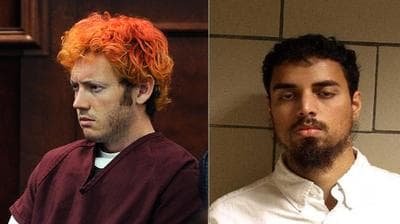Advertisement
Could The FBI Do More To Track 'Lone Wolf' Killers, Not Just Terrorists?
Resume
Twenty-four-year-old Colorado shooting suspect James Holmes bought an assault rifle, two automatics, a shotgun and 6,000 rounds of ammunition without ever showing up on the radar of law enforcement.
Yet 26-year-old Muslim-American Rezwan Ferdaus, who pleaded guilty in Boston last week to terrorism charges related to a plot to fly remote-controlled airplanes into federal buildings, was the focus of a year-long sting operation that provided him with material support that he otherwise likely would not have had to commit crimes. A comparison of the two cases raises troubling questions about FBI priorities and intelligence-gathering.
National security expert James Bamford told WBUR reporter David Boeri, "I think if Holmes had a Muslim name he would have come into a great deal of attention with a lot less purchases.” Boeri suggests that FBI could use the kind of intelligence-gathering process the Drug Enforcement Agency puts into practice in Massachusetts: staying in contact with community leaders who might be able to tip agents off to any unusual behavior.
Guest:
- David Boeri, WBUR reporter
This segment aired on July 24, 2012.